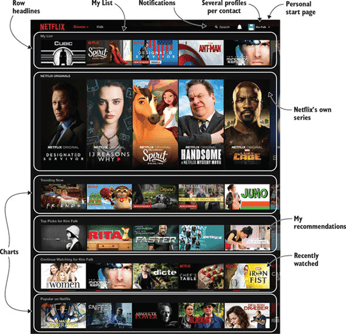
Dr Anu Sahni, Lecturer and Programme Director in NCI's School of Computing, shares a recent innovation her research group has been working on to help the retail sector boost sales using recommender systems, including a white paper on the process: Innovation Partnership Collaboration between NCI and Glantus Ltd.
When was the last time you clicked on a movie or a TV show recommended by Netflix or Prime Video or Disney+ to watch a movie that matches your taste? Maybe last night or last weekend. Do you even realise it, when you are listening to your favourite song recommended by YouTube or Spotify, or buying an item from Amazon because ‘people who bought this also bought…’? Probably not!
 Do you ever think how these systems know your interests so well? Again, probably no! We have become so accustomed to getting recommendations from systems that, not only do we not think about it , but we kind of expect to be recommended items relevant to us. This is because there is an ocean of items out there, which we cannot scan, and therefore we expect to be shown only the items that suit our tastes, interests and current needs. So, before we dig in to how these systems make recommendations, let’s see what a recommender system is.
Do you ever think how these systems know your interests so well? Again, probably no! We have become so accustomed to getting recommendations from systems that, not only do we not think about it , but we kind of expect to be recommended items relevant to us. This is because there is an ocean of items out there, which we cannot scan, and therefore we expect to be shown only the items that suit our tastes, interests and current needs. So, before we dig in to how these systems make recommendations, let’s see what a recommender system is.
A recommender system calculates and provides relevant content to the user, based on knowledge of the user, the content, and the interactions between the user and the items. Most of the large tech companies, such as Amazon, Netflix, Spotify, YouTube, and Google, benefit from recommender systems to a great extent. McKinsey estimates that 35% of consumer purchases on Amazon come from product recommendations, although the e-commerce giant itself has never revealed its own estimates.
Problem
Data is now a critical corporate asset that can be used to make more informed business decisions, improve marketing campaigns, optimise business operations, and reduce costs, all with the goal of increasing revenue and profits. But on the road to becoming data-driven, many organizations still struggle to connect analytics to action.
There are very few industries that can benefit from the generation of high-quality data as much as the retail sector. Retailers have at their disposal vast amounts of data relating to consumer behaviour and preferences and so on. The integration of systems to deliver real-time and actionable data-driven insights across the business is a top priority for retailers. However, cost, lack of available data experts, knowledge, lack of internal support, organisational culture, talent, and time make it difficult to fulfil their organisation’s potential in relation to data usage. As data science platforms become more accessible and easy to use, more retailers will start taking advantage of such systems to boost sales by promoting context-based products to customers.
Solution
NCI has been working closely with a Dublin-based company in helping them to bring the power of recommender systems to their customers. The research and techniques can be applied across domains within retail and we are interested in understanding more about the needs of retailers.
The research group within the School of Computing is a team with a wide range of experience in designing and delivering data analytics solutions and includes Dr Pramod Pathak, Dr Paul Stynes, Pramit Kumar, and myself, Dr Anu Sahni. The technical details are covered in a freely accessible white paper, Innovation Partnership Collaboration between NCI and Glantus Ltd.
During the study, we identified the need for a simple, low cost, fully automated recommender system for retailers – RETAILRECSYS - that can easily be plugged into a business’s systems to recommend relevant products to their customers. The RETAILRECSYS solution will identify and combine an appropriate suite of software components, tools, techniques, and underlying technology services (e.g., data storage services) to automatically apply data science processes to sets of raw input data, such as transactions, market/shopping basket, etc. Furthermore, the RETAILRECSYS solution will offer full data science process lifecycle support from ingesting the raw data to facilitating model operationalization and integration with business processes.
Has your business/your customers’ business also generated a lot of data over the years? Is the data being used to drive your sales up? If not, please spare two minutes to answer just three questions for us to understand what recommendations would benefit you the most.










